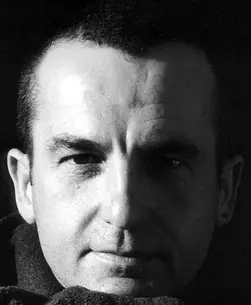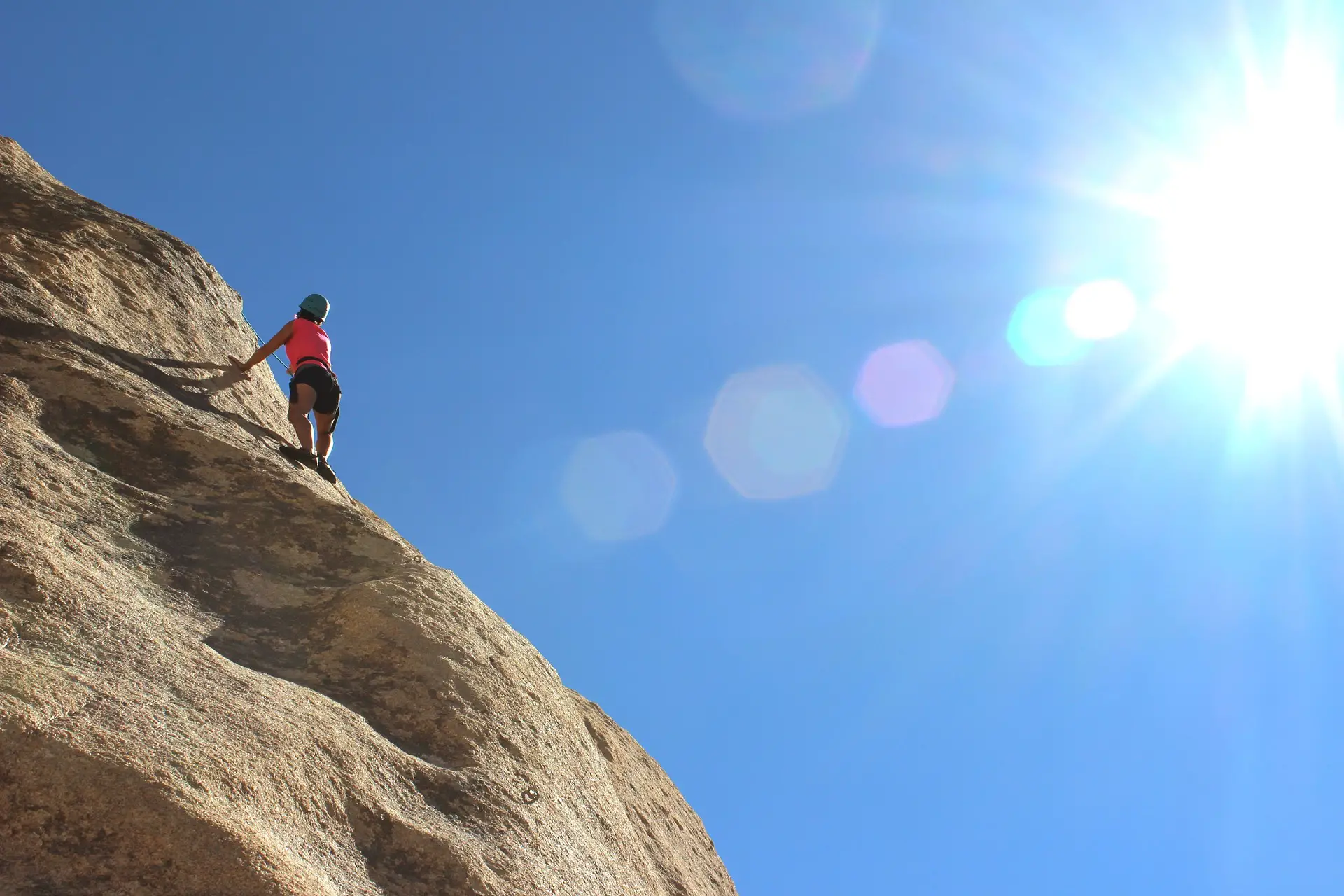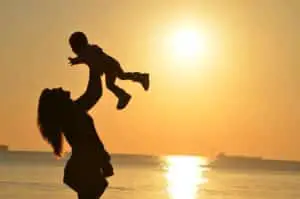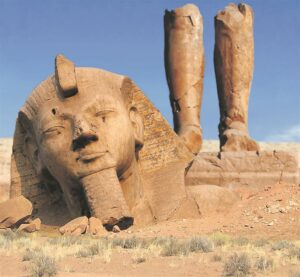
FULL POEM - SCROLL DOWN FOR LINE-BY-LINE ANALYSIS
I decide to do it free, without a rope or net.
First, the old brogues, dusty and cracked;
an easy scramble onto his trousers,
pushing into the weave, trying to get a grip.
By the overhanging shirt I change
direction, traverse along his belt
to an earth-stained hand. The nails
are splintered and give good purchase,
the skin of his finger is smooth and thick
like warm ice. On his arm I discover
the glassy ridge of a scar, place my feet
gently in the old stitches and move on.
At his still firm shoulder, I rest for a while
in the shade, not looking down,
for climbing has its dangers, then pull
myself up the loose skin of his neck
to a smiling mouth to drink among teeth.
Refreshed, I cross the screed cheek,
to stare into his brown eyes, watch a pupil
slowly open and close. Then up over
the forehead, the wrinkles well-spaced
and easy, to his thick hair (soft and white
at this altitude), reaching for the summit,
where gasping for breath I can only lie
watching clouds and birds circle,
feeling his heat, knowing
the slow pulse of his good heart.

LINE-BY-LINE ANALYSIS
STANZA 1
I decide to do it free, without a rope or net.
The poem begins ‘in media res’, in the first person and in the present tense – immediately creating a sense of action and excitement. The ‘rope’ and ‘net’ are references to climbing equipment, introducing the extended metaphor present throughout the poem. Climbing without them symbolises the narrator’s intrepid nature as well as the trust he has in his grandfather.
First, the old brogues, dusty and cracked;
The narrator’s grandfather’s ‘dusty and cracked’ shoes are a metaphor for his age and experience – he, like his shoes, have seen and endured a lot over the years.
an easy scramble onto his trousers,
pushing into the weave, trying to get a grip.
These two lines are imagery of climbing a mountain, further referencing how climbing a mountain is a metaphor for getting to know his grandfather throughout the poem. The shift from ‘easy scramble’ to ‘trying to get a grip’ conveys the increasing difficulty of the climb as it progresses.
By the overhanging shirt I change
direction, traverse along his belt
The enjambement at the end of these lines reflects the narrators slick change of direction – the climb requires a change in approach but not a pause, hence, remains rather effortless for the narrator.
to an earth-stained hand. The nails
are splintered and give good purchase,
His grandfather’s ‘earth-stained hand’ and ‘splintered’ nails are symbolic of his old age and experience. ‘Earth-stained’ alludes to his keenness for nature and the outdoors, whilst his ‘splintered’ nails emphasise how he has been weathered by this environment over the years. The fact that they ‘give good purchase’ is a metaphor for how his grandfather’s wisdom and experience benefit the youthful narrator.
the skin of his finger is smooth and thick
like warm ice. On his arm I discover
The simile ‘like warm ice’ to describe the skin on his grandfather’s fingers is an oxymoron as ice only exists below freezing temperatures, otherwise it melts to water. This sense of warmth, however, signifies the comfort that the narrator feels when he is close to his grandfather.
the glassy ridge of a scar, place my feet
gently in the old stitches and move on.
The ‘glassy ridge of a scar’ is further mountain imagery and implies that the man has suffered pain and suffering in his life, linking to the idea that he has been weathered by the environment – as though he is a mountain being eroded by the wind and the rain.
At his still firm shoulder, I rest for a while
in the shade, not looking down,
for climbing has its dangers, then pull
His grandfather’s ‘still firm shoulder’ provides a shaded place for the narrator to rest and recover. The way in which his shoulders offer shade from the sun is a metaphor for the sense of security and safety that the narrator feels in his grandfather’s arms.
myself up the loose skin of his neck
to a smiling mouth to drink among teeth.
Refreshed, I cross the screed cheek,
The imagery of ‘drink among teeth’ is a metaphor that likens the narrator gaining wisdom from his grandfather’s words and advice to the refreshing qualities of drinking from a fresh mountain spring.
to stare into his brown eyes, watch a pupil
slowly open and close. Then up over
The narrator staring into his grandfather’s ‘brown eyes’ conveys the closeness in their relationship and the strong bond that they share. The fact that his pupil slowly opens and closes suggests a weariness to the man, indicative of his old age, that juxtaposes the narrator’s youthful energy.
the forehead, the wrinkles well-spaced
and easy, to his thick hair (soft and white
at this altitude), reaching for the summit,
In a metaphorical sense, the grandfather’s ‘wrinkles’ are the ridges which act as footholds on a mountain, whilst his ‘soft and white’ ‘thick hair’ is the snow that settles on a mountaintop where the altitude is high and the temperature is low.
where gasping for breath I can only lie
watching clouds and birds circle,
The narrator is exhausted as he reaches the summit – in the poem’s literal sense the climb has been a long and arduous one, hence, metaphorically the narrator has taken great efforts to get to know his grandfather. This has potentially been made difficult by their age and cultural differences, represented by the challenges facing the narrator during the climb.
feeling his heat, knowin
the slow pulse of his good heart.
The ‘heat’ the narrator feels from his grandfather links to the sense of comfort that he feels when in his arms. This feeling of warmth is also symbolic of the love and affection shared between grandfather and grandson, whilst the grandfather’s slow beating ‘good heart’ further emphasises his caring, nurturing qualities.


